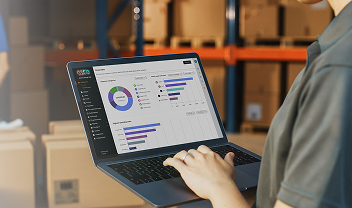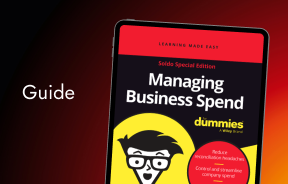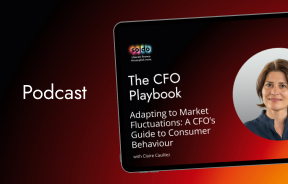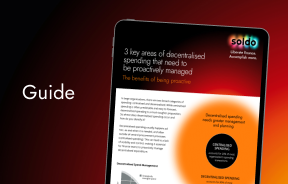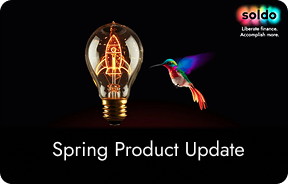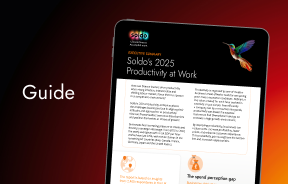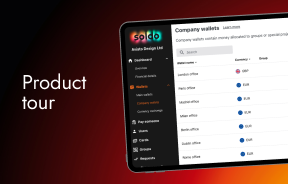Episode 57: Mosaic | Bijan Moallemi, Co-Founder and CEO
Bijan Moallemi has nearly a decade of experience building and leading finance functions at companies like Qualcomm and Palantir. He knew CFOs deserved access to better tools, so he co-founded Mosaic Finance to build the next generation of finance software for CFOs and their teams. Born out of their own experiences in finance, Bijan and his co-founders have built the Mosaic platform as a resource that combines big data and machine learning to provide powerful predictive reporting capabilities.
To be a successful CFO, Bijan feels you need the tools and basic technical skills to support your business now and to plan for the future, while reducing the effort required by your team to achieve your goals. He thinks CFOs have historically been underserved, and financial professionals deserve accessible tools that save time and money, while providing key insights and analytics to better your business.
Bijan believes that improving workflows that are self-serving, rather than adding to your list of responsibilities, will free up your time and provide more information to make more educated decisions. He feels it is important to have an application like Mosaic that can accomplish that by providing real-time analysis and reporting, giving you perspective on your company’s past, present, and future. Adding automation to data ingestion and processing can help focus your business forecasting and scenario planning to be ready for anything that may come up.
In this episode of The CFO Playbook, Bijan explains why it is more important than ever to understand the financial ins and outs of a business to make sure you know exactly what’s going on within your organization. He talks about how Mosaic offers a tool that can help financial professionals as they process through pain points with data and analytics, allowing for a faster and more focused financial team that can make a bigger impact on the business. Bijan also explains why he thinks communication, collaboration and culture building are keys to success, and talks about the benefits of opening up your company to a remote workforce as a way to ensure you have access to the best talent pool.
Take The CFO Playbook Listener Survey to help us improve the show. You’ll also be entered to win your choice of the latest iPad Pro or a Samsung Galaxy S7.
##
Guest Analysis
Name: Bijan Moallemi
What he does: Bijan Moallemi, Co-Founder and CEO of Mosaic, a company building the next generation of finance software for CFOs and their teams. Born out of their own experiences in finance, Bijan and his co-founders have designed the Mosaic platform as a tool that combines big data and machine learning to provide powerful predictive reporting capabilities. With nearly a decade of experience building and leading finance functions at companies like Qualcomm and Palantir, Bijan feels it is more important than ever to understand the financial ins and outs of a business to make sure you know exactly what’s going on within your organization. He sees Mosaic as a tool that can help financial professionals as they process through pain points with data and analytics, allowing for a faster and more focused financial team that can make a bigger impact on the business.
Key Quote: “I think it all starts with the data. If you do not understand the data, if you’re not pulling in many different data sets that the business is using, and you can’t make sense of that, then you can’t really do much. So I would say for us, the secret sauce behind mosaic is pulling in data and then normalizing it, cleaning it, and building the solid foundation to work off of.”
Where to find Bijan: https://www.linkedin.com/in/bijanmoallemi/
##
From Bijan’s Playbook
Lead by example
Today’s CFO has to wear many hats, including being an operator, an executive, a technologist, and an adviser to become a trusted decision-maker in their business. It is important to get everyone in your organization aligned on data. As a finance leader and partner within your organization you need to go above and beyond, not just understanding the data itself, but understanding things from the perspective of your partners throughout the business. This will allow you to advocate for them and empower them to utilize the data to run the organization better.
Open your aperture
A strategic CFO should prioritize collaboration throughout their business so they can become a central and connective resource for the entire organization. Building cohesion, trust, communication, collaboration, and culture within your organization is paramount. In this day in age, it is important to open your aperture when building out your company and team. Being open to remote workers will open your talent pool. What separates good organizations from the great, are the people. So, being able to tap into a global talent pool is an incredible opportunity.
Fight for finance’s future
Finance is often at the bottom of the totem pole when it comes to technology updates, but CFOs today are under more pressure than ever to be fast, accurate, and agile. Finance leaders can earn their seat at the table by proactively taking a more strategic role in their business. To do that, the modern CFO needs to evolve beyond the traditional record-keeping identity. A good CFO will get their people the information they need before they even ask for it. Strategic CFOs should work to rise above back-office reporting to be forward-looking strategic partners to the rest of the business.
Tout the technology
A key to success for today’s CFO is to be forward-thinking, being armed with the information to form the best strategies. They need to be able to plug into all the different data sources that the business is using. Doing things manually can be labour intensive and error prone. Utilizing different technologies and tools to help automate processes can free up your time, allow you to focus, make your operation more tactical, and propel the business forward. Strategic CFOs prioritize deep collaboration with business leaders so they can become the connective tissue for the entire organization.
##
Episode Highlights
Keep your options open
“You can’t just have one view of the world, especially in this day and age. Things are unpredictable and we’ve seen that with the markets over the last six months. We’ve seen that with the pandemic over the last couple of years. So, how do you make scenario planning and having different views of the world and different paths that your business can go on as easy as possible? That’s a feature set that we’ve spent a lot of time building from day one, to ensure that it is very easy to have multiple scenarios, compare them, and really keep all options open.”
Keep sight of the culture
“I’d say very early you need to realize that you have to be proactive, and you have to be intentional, and you have to really drive things forward with a lot of inertia. If you don’t pay attention to things like culture, they’re going to happen one way or another. You can either be intentional about culture or you can be hands-off and let it manifest the way that it’s going to manifest. For areas like that, you never want to be doing surgery to your culture and having to weed things out. So, I think from our perspective, we would rather be more intentional, knowing it’s going to take more time, more focus, because it’s that important for us here at Mosaic.”
Deliver digestible data
“When you think about the role of the CFO and folks inside of the office of the CFO, it is a highly technical function these days. You have to make sense of all the different data sets across the business, pull them together real-time, massage the data, and present it back to the business. You need to present it back in a way that the business can understand, and it has to be digestible. That does not mean a balance sheet or a statement of cash flow. It has to be something that is consumable and then keep in mind the speed at which you’re pushing it back out to the business. It can’t be late.”
Save time with technology
“When I think about technology in the office of the CFO, as a former practitioner myself, I’m disappointed to be honest. I feel like we’ve really been overpromised and under delivered to when it comes to great finance tech over the last 20 years. So, we thought there might be this resistance or reluctance to want to try something new. I’d say in practice that hasn’t necessarily been the case. I think what you’re seeing is folks across the finance world who see their peers in sales and marketing, HR, legal, design, and engineering who have amazing SaaS-based tooling that gives them leverage. It saves them time. It makes them more powerful in their roles. So, I think on the finance side of the practice, what we’ve actually seen is folks are willing to try something new.”
Top quotes:
3:40
We had this kind of notion in the back of our heads that if we didn’t take this a step further and try to solve this problem for other peers, other finance leaders, it might be something that we would regret for the rest of our lives. And so that’s really where the idea behind Mosaic came from. It was really born out of our own experiences. We didn’t just wake up one day and decide to start the company. It felt like the next natural step for us.
4:15
You think about the role of CFO and it’s so dynamic these days to be strategic. You really need to be able to plug into all the different data sources that the business is using. So, when we say technical, what that means is a finance team that is technical enough to set up a database, set up an ETL pipeline, write code; to hook into the APIs of all the different business systems that we were using. Of course, at a hyper-growth company you’re using a new SAS based tool, it feels like every day, every week. Then a lot of the work that typically a finance organization might be doing in Excel or Google sheets, we’re actually doing that through code. And the great thing is it’s real-time and it is always up to date.
5:38
We think about what does it mean to be strategic on the finance side. If you’re spending 80% of your time pulling down data from NetSuite, from Salesforce, cleaning that data, copy-pasting it into your model and rolling forward the formulas, that’s painful. That’s manual. That’s labour-intensive and it’s error-prone. It’s not strategic in any way. The strategic part comes when you can take a step back, you’ve done that work and you can convey what the numbers say and partner with folks across the business to use that data to propel the business forward. From our perspective, by automating away the 80% of operational-tactical work, it allows you to be more strategic and focus on really propelling the business forward.
8:36
When you think about the role of the CFO and folks inside of the office of the CFO, it is a highly technical function these days. You have to make sense of all the different data sets across the business, pull them together real time, massage the data, and present it back to the business. You need to present it back in a way that the business can understand, and it has to be digestible. That does not mean a balance sheet or a statement of cash flow. It has to be something that is consumable and then keep in mind the speed at which you’re pushing it back out to the business. It can’t be late.
9:52
Finance is typically at the bottom of the totem pole when it comes to getting resources and time from the data team. Yes, you can use a database. You can use a looker. You can use a Tableau. It is going to take you at a minimum 9 to12 months to stand up that stack. And you still need to be able to be proficient with how these systems work, to be able to tell the data team exactly what they need. You need to be able to get those outputs. From our perspective, finance really deserves a tool that is accessible to them. It doesn’t take a year and hundreds of thousands of dollars to set up and that’s really one of the main drivers behind mosaic.
11:49
When I think about technology in the office of the CFO, as a former practitioner myself, I’m disappointed to be honest. I feel like we’ve really been over promised and under-delivered to when it comes to great finance tech over the last 20 years. So, we thought there might be this resistance or reluctance to want to try something new. I’d say in practice that hasn’t necessarily been the case. I think what you’re seeing is folks across the finance world who see their peers in sales and marketing, HR, legal, design, and engineering who have amazing SaaS based tooling that gives them leverage. It saves them time. It makes them more powerful at their roles. So, I think on the finance side of the practice, what we’ve actually seen is folks are willing to try something new.
14:28
I think it all starts with the data. If you do not understand the data, if you’re not pulling in many different data sets that the business is using, and you can’t make sense of that, then you can’t really do much. So I would say for us, the secret sauce behind mosaic is pulling in data and then normalizing it, cleaning it, and really building a solid foundation to work off of.
17:44
You can’t just have one view of the world, especially in this day and age. Things are unpredictable and we’ve seen that with the markets over the last six months. We’ve seen that with the pandemic over the last couple of years. So, how do you make scenario planning and having different views of the world and different paths that your business can go on as easy as possible? That’s a feature set that we’ve spent a lot of time building from day one, to ensure that it is very easy to have multiple scenarios, and compare them, and really keep all options open.
20:20
The big learning for me is getting everyone aligned on the data. And as a finance business partner, really going above and beyond, not just understanding the data, but really trying to understand things from the business partners’ side and try to be an advocate for them, making sure that you’re empowering them with the data that they need to run their organization better.
23:00
I think this day and age you’re really closing the aperture by saying, ‘hey, I’m only going to build a company in the city.’ The talent pool is going to be significantly smaller. And there are amazing people all across the us all across the world. I think what separates good organizations from great, is the people. So, being able to tap into that global talent pool has been incredible. But, remote-first also causes challenges. It’s very easy to miss out on those water cooler conversations and things that happen just kind of happenstance when you’re around folks in the office.
23:44
I’d say cohesion, trust, communication, collaboration, culture, building, all of those things are at least in my opinion, an order of magnitude, harder to do in a remote-first environment than they are in an in-person environment. I’d say very early you need to realize that you have to be proactive, and you have to be intentional, and you have to really drive things forward with a lot of inertia. If you don’t pay attention to things like culture, they’re going to happen one way or another. You can either be intentional about culture or you can be hands-off and let it manifest the way that it’s going to manifest. For areas like that, you never want to be doing surgery to your culture and having to weed things out. So, I think from our perspective, we would rather be more intentional, knowing it’s going to take more time, more focus, because it’s that important for us here at Mosaic.
31:04
For us, one of the big learnings has been as we started to push a little bit upmarket, get customer traction, moving from a founder first product mindset to more of a facilitator role, where we want to amplify the voice of the customer. We want to hear what our CS reps are hearing out in the field. We want to hear what sales and marketing are seeing in the pipeline. So, it’s definitely something that has been an interesting shift for me and my co-founders. I’d say for us success is really understanding what our customers like and don’t like about the product and trying to understand where it needs to improve. Ultimately I think the way we win is by understanding our customer needs and delivering a solution that’s 10 times better than anything that exists today.
34:16
You have to carve out time to really embed yourself with the different business owners that you’re working with, whether that’s folks on parts of GNA engineering, product sales, really take a step back and try to understand how they’re seeing the world and how you can best empower them with the data that you’re responsible for.



